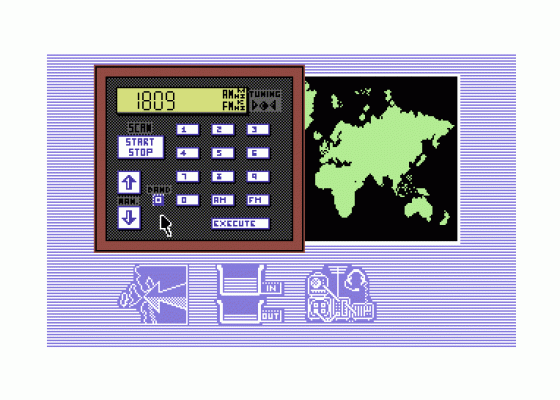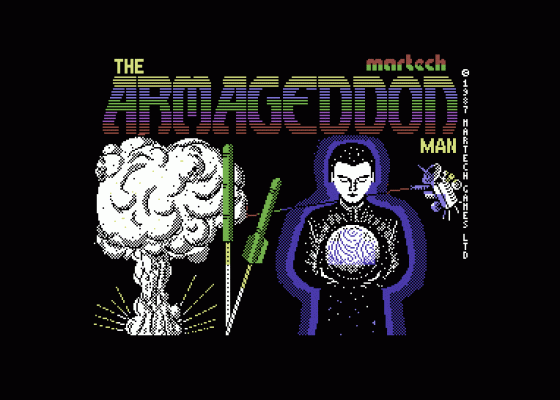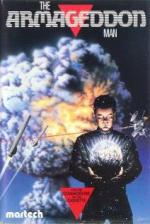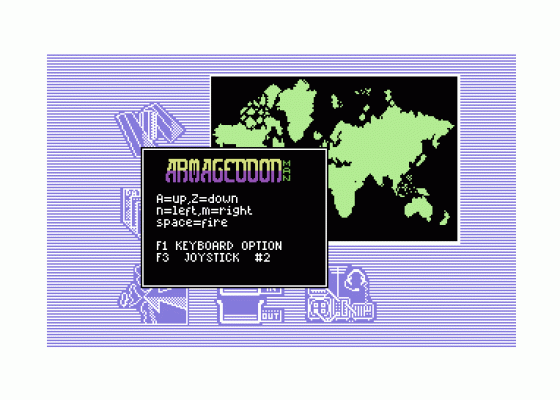
C&VG
 1st October 1987
1st October 1987
Categories: Review: Software
Publisher: Martech
Machine: Spectrum 48K/128K
Published in Computer & Video Games #72
The Armageddon Man
Armageddon out of here! The world is a dangerous place and I've been put in total charge of it! Talk about mind-boggling - it's even worse than running the C&VG office!
Martech's newie is a strategy game which you'll either love or hate. There's no real action - but it will tax your patience and test your diplomatic skills to the max.
Like Catch 23, it's a big game - but this time not big in terms it's a complex simulation. And although it's supposed to be set far in the future some of the scenarios you come across are horribly close to the present.

Playing the game is like Risk or Diplomacy in reverse - instead of looking after the interests of one country you have to babysit the whole world! Which makes it a bit of an acquired taste.
The year is 2032, there are sixteen nuclear superpowers and the world is balanced on a knife edge. To prevent disaster they have formed the United Nuclear Nations and appointed a Supreme Commander to oversee the economies, technological development and weaponry of these nations.
The Supreme Commander - that's you! - sits high above the world in a space station codenamed Olympus, collecting information and reports via a network of defence and intelligence satellites. You are the Armageddon Man, in control of the destiny of the Earth.

Your task is to prevent Armageddon. How you achieve this is up to you! There are three main aims.
Aim One: Achieve a good working relationship with each individual country.
There are sixteen member counties of the UNN. Each country has its own political system, its own problems, its own aims and most importantly its own personality. The only thing they all have in common is a desire not to be destroyed. You must learn how to deal with each country in different situations, some serious, some not so serious.

Each country will be in regular contact with you for advice, guidance or approval of their actions. You must learn when to give way, when to be firm and when to compromise.
A country which becomes unstable is much more likely to be unreasonable or aggressive towards both you and any other countries it has poor relations with.
Aim Two: Promote good working relationships between each individual country and each of its fifteen fellow UNN members.

Aim Three: Achieve economic stability.
Each country has two principle needs, food and resources. If a country has a deficiency in either of these areas it will be less stable. It will also be seeking to gain any shortfall from other countries, either by coercion or trade. You must keep an eye on each country's resources and as far as possible try to allocate them fairly or in whatever way you feel is appropriate given the prevailing conditions. The extent to which you are able to control the movement of resources will depend largely on your relationship with each country involved and also on their relationship with each other.
Aim Four: Achieve military stability.
Some countries may be naturally more aggressive, others more peaceful. However, of paramount importance to a country is its own security.
1. Information If you select this icon a window will open presenting you with three further sub-icons. By choosing one of these you will be presented with the latest intelligence reports on each country's status in three vital areas, food, resources, missiles.
2. Communication This icon is divided into IN and OUT. If you choose the IN icon you can look at letters that countries send to you. If you choose the OUT icon a menu of standard letters that you can send to countries will appear.
Satellites: Choice of this icon will display the satellites which are available. By moving the cursor over a satellite and pressing Fire, you pick the satellite up. Move the cursor over the World Map to position the satellite in geo-stationary orbit and press Fire to release it.
Radio: The world's airwaves are alive with radio transmissions which originate from each of the sixteen UNN member countries. The information carried by these transmissions may provide you with invaluable information.
Wars come in two types, conventional or nuclear. Conventional wars are punitive. In such a conflict, both sides realise that due to the enormous advances in weapon technology it is virtually impossible for either side to win. However, they can ease the tension between two countries, but whether this happens depends entirely on the relative strength of each country involved and further to that, on who attacked who.
They do little damage in themselves but if they are not over quickly, they tend to escalate into nuclear war.
If one country launches a missile or missiles at another country, you will see the missiles tracking towards their targets on your world map. At this tage, it will be too late for you to move your SDI satellites to shoot them down. If you did not spot the conflict coming and did not cover it with your satellites, then all missiles launched will strike their targets.
A side effect of any nuclear conflict is an increase in the level of radioactivity in the Earth's atmosphere.
It is not necessary, therefore, for every country in the world to be destroyed for Armageddon to occur. A large scale nuclear war between two countries only may sill release enough lethal radioactivity to kill the entire population of the world.
As you can see you've got a lot on your plate if you decide to become the Armageddon Man.
I went for a total nuclear disarmament policy - but before I could get rid of all the missiles Japan and Libya decided - out of the blue - to have a little conflict! No warning at all.
Then I attempted to start a big conflict by doing stupid things and suddenly got fired!
The Armageddon Man is a thought provoking and well put together game - but you'll have to be a strategy or wargame fan to enjoy it to the full.
Other Reviews Of The Armageddon Man For The Spectrum 48K/128K
The Armageddon Man (Martech)
A review by Philippa Irving (Crash)
The Armageddon Man (Martech)
A review by Gwyn Hughes (Your Sinclair)
Armageddon Man (Martech)
A review by Tamara Howard (Sinclair User)
Scores
Amstrad CPC464 Version| Graphics | 70% |
| Sound | 0% |
| Value For Money | 70% |
| Playability | 60% |
| Overall | 50% |
Scores
Commodore 64 Version| Graphics | 70% |
| Sound | 0% |
| Value For Money | 70% |
| Playability | 60% |
| Overall | 50% |
Scores
Spectrum 48K/128K Version| Graphics | 70% |
| Sound | 0% |
| Value For Money | 70% |
| Playability | 60% |
| Overall | 50% |





